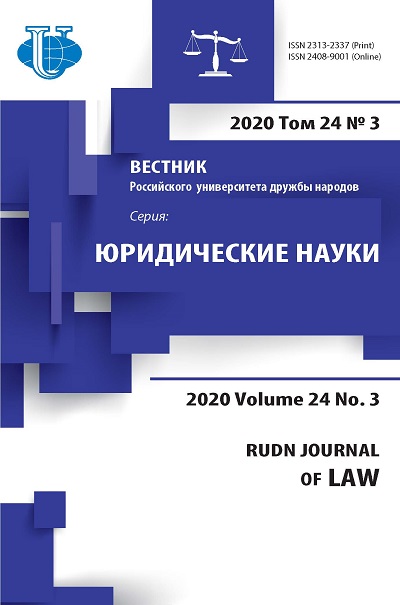ВЫБОР ОБЪЕКТА ИССЛЕДОВАНИЯ В ТЕОРИИ ПРАВА
- Авторы: Бекбаев Е.З.1
-
Учреждения:
- Евразийская юридическая академия им. Д.А. Кунаева
- Выпуск: Том 24, № 3 (2020)
- Страницы: 530-546
- Раздел: МЕТОДОЛОГИЯ ПРАВОВЫХ ИССЛЕДОВАНИЙ
- URL: https://journals.rudn.ru/law/article/view/24560
- DOI: https://doi.org/10.22363/2313-2337-2020-24-3-530-546
- ID: 24560
Цитировать
Полный текст
Аннотация
Актуальность проблемы выбора объекта исследования в теории права обуславливается необходимостью решения дискуссионного вопроса о плюрализме в понимании права. Отмечается, что одна из причин существования в юридической науке теоретико-правового плюрализма во взглядах ученых на понятие права заключается в отсутствии единых критериев выбора объекта исследования в науке общей теории права. Ситуация с понятием права в юридической науке, в том числе с плюрализмом мнений, рассматривается во многом как следствие реализованной установки ученых и практиков «сначала понять право», а затем создать «единое» понятие права. Проведенные в юридической науке фундаментальные исследования и широкие дискуссии по проблемe понятия права оцениваются как неоспоримое благо, одним из параметров которого является выход на принцип разделения объекта и предмета юридической науки. Показывается, что при построении научной теории права первичным является вопрос об объекте исследования, то есть вопрос о самом праве как особом фрагменте окружающего нас мира, а не дискуссионный вопрос о понятии права. Однако на практике обнаруживается, что при выделении объекта научного познания в общей теории права ученые выбирают для исследования самые разные фрагменты окружающего нас мира, хотя обозначают их одним и тем же термином «право». Поскольку научному исследованию подвергаются разные объекты с названием «право», не представляется возможным рассчитывать на получение единого понятия права. С учетом результатов анализа работ по проблеме понятия права и данных современного науковедения, на рассмотрение специалистов предлагается следующий набор атрибутивных признаков для выбора права как объекта исследования науки теории права: «Право есть совокупность социальных норм, закрепленных государством в письменности и предназначенных для взаимодействия людей между собой и с публичной властью в лице государства и иных субъектов».
Ключевые слова
Об авторах
Ерзат Зейнуллаевич Бекбаев
Евразийская юридическая академия им. Д.А. Кунаева
Автор, ответственный за переписку.
Email: erzat_bek@mail.ru
доктор юридических наук, профессор кафедры Конституционного, международного права и таможенного дела
A05E8F6, г. Алматы, Республика Казахстан, ул. Курмангазы, д. 107Список литературы
- Абдильдин Ж.М. Логика об универсальных формах и методах мышления / Ж.М. Абдильдин, Р.Ж. Абдильдина. Астана: Флориант, 2014. 352 с
- Алекси, Р. Понятие и действительность права (ответ юридическому позитивизму) Rodert Aleхy. Begriff und Geltug des Rechts; пер. с нем. / [А. Лапаев, Ф. Кальшойер]; [В. Бергманн, пред., сост.]; [Т. Яковлева, науч. ред.]. М. Инфотропик Медиа, (Германская юридическая литература: современный подход: серия; Кн. 1). 2011. 192 с
- Гегель Г.В.Ф. Энциклопедия философских наук. Т. 3. Философия духа. Отв. ред. Е.П. Ситковский. Ред. коллегия: Б.М. Кедров и др. М., «Мысль», 1977. 471 с
- Зиманов С.З. Общая теория права и ее место в системе правоведения (теоретикометодологические аспекты) / препринт доклада. Алма-Ата: «Наука» Казахской ССР, 1982. 26 c
- Теория современной конституции / Хабриева Т.Я., Чиркин В.Е. М.: Норма, 2005. 320 c
- Теория государства и права. Учебник для юридических вузов и факультетов. Под ред. В.М. Корельского и В.Д. Перевалова. М.: Издательская группа НОРМАИНФРА М. 1998. 570 с
- Корнев А.В. Толкование права в контексте различных типов правопонимания. Журнал российского права. № 8, 2016, С. 29-43. doi: 10.12737/20901
- Лазарев В.В. Законодатель как сторона в конституционном судопроизводстве: судебные речи / В.В. Лазарев. М.: Институт законодательства и сравнительного правоведения при Правительстве Российской Федерации: ИНФРА-М, 2015. 880 с
- Лазарев В.В., Липень С.В., Саидов А.Х. Теория государства и права. Изд. «AKADEMIYA», Ташкент, 2007. 736 c
- Лившиц Р.З. Теория права. Учебник. М.: БЕК, 1994. 224 с
- Общая теория государства и права. Академический курс в 2-х томах. Отв. ред. проф. М.Н. Марченко. М.: Изд. «Зерцало». Т. 1: Теория государства. 1998. 408 с
- Муромцев Г.И. Источники права в развивающихся странах Азии и Африки. Система и влияние традиции: Монография. Отв. ред.: Жидков О.А.: М.: изд: УДН. М.: 1987. 152 c
- Муромцев Г.И. Юридическая техника: Некоторые теоретические аспекты / Г.И. Муромцев // Правоведение. 2000. № 1. С. 9-20
- Поляков А.В. Общая теория права: феноменолого-коммуникативный подход. Курс лекций. 2-е изд., доп. СПб.: Юридический центр Пресс, 2003. 485 с
- Проблемы общей теории права и государства. Учебник для вузов. Под общ. ред. члена-корр. РАН, доктора юрид. наук. проф. В.С. Нерсесянца. М.: Издательская группа НОРМА-ИНФРА М, 1999. 832 с
- Проблемы общей теории права и государства: Учебник для вузов / Под общ. ред. академика РАН, д.ю.н., проф. В.С. Нерсесянца. М.: Норма, 2004. 832 с
- Спиридонов Л.И. Теория государства и права. Учебник. М.: «ПРОСПЕКТ», 2000. 304 с
- Сырых В.М. Логические основания общей теории права: В 2 т. Т. 1: Элементный состав. 2-е изд., испр. и доп. М.: Юридический Дом «Юстицинформ». 2001. 528 c
- Сырых В.М. Неизвестный Ленин: теория социалистического государства (без пристрастия и подобострастия). М.: Юрлитинформ. 2017. 520 с
- Тихомиров Ю.А. Право как мера опережающего отражения действительности / Правовые модели и реальность: монография / О.А. Акопян, В.И. Власова, С.А. Грачева и др.; отв. ред. Ю.А. Тихомиров, Е.Е. Рафалюк, Н.И. Хлуднева. M.: Институт законодательства и сравнительного правоведения при Правительстве Российской Федерации: ИНФРА-М, 2014. 280 с
- Тихомиров Ю.А. Публичное право. Учебник. М.: БЕК, 1995. 493 с
- Трубецкой Е.Н. Энциклопедия права. СПб.: Лань, 1998, 224 c
- Венгеров А. Б. Теория государства и права: Учебник / А.Б. Венгеров. 2-е изд. М.: Омега-Л, 2005. 608 с
- Власенко Н.А. Разумность и определенность в правовом регулировании // Власенко Н.А. Избранное / Н.А. Власенко. М.: Норма, 2015. 672 с
Дополнительные файлы















